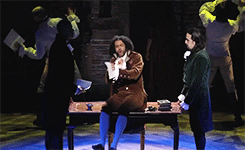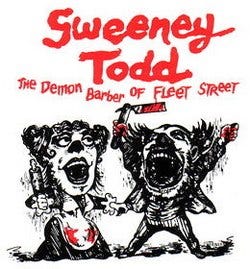Your Characters Should Want Things
A couple of months ago, I had the privilege of hearing Naomi Novik, author of UPROOTED and SPINNING SILVER, speak about fantasy and folklore at a local bookstore. She likened fairy tales to desire lines: those eroded paths in grass or woodland that form when many people seek out the same things—a shortcut, a nice view, a way around an obstacle. They can endure for centuries. Fairy tale characters are full of desires: they want fortune, they want companionship, they want power, they want justice. And fairy tales endure because we share those desires; to be human is to want things—things abstract and tangible, essential and frivolous, reasonable and dangerous.
So for me, the single biggest factor in whether I find a story emotionally compelling is desire: how badly does the protagonist want whatever it is that they want? Is their desire fuzzy and nebulous, or specific, personal, and urgent? Does their desire appear on page one and propel them throughout the story? If a character wants anything desperately and they’re doing something about it, I'm likely to sit up and pay attention. What can I say? Obsessed people are interesting to read about.

When brainstorming examples of characters who really, really want things, the first stories that came to mind were actually musicals. Musicals are fantastic case studies for characterization, because the format removes the need for realism that exists in other mediums—and therefore allows audiences a clearer view into character's psyches. People don't typically go around declaring out loud who they are and what they want, but musical characters do exactly that. Usually in the second or third song, after they've set the stage.
I am reaching, but I fall, and the night is closing in, as I stare into the void, to the whirlpool of my sin...I'll escape now from that world, from the world of Jean Valjean. Jean Valjean is nothing now; another story must begin!
Not Barker. That man is dead. It's Todd now, Sweeney Todd, and he will have his revenge!
Hey yo, I'm just like my country; I'm young, scrappy and hungry, and I'm not throwing away my shot!
Sadly, breaking out into song at emotionally charged moments isn't an option for most characters. But even so, you as the writer should know: if your protagonist’s life was a musical, how would their introductory song go? What desire would they declare?
Of course, what we want most can shift and change over time—because we've achieved a long-held goal, or realized we wanted something else more, or found that the thing we wanted is no longer an option. I’m always fascinated by stories where the protagonist's greatest, deepest, most foundational desire... shifts. The desire path takes a turn.
But such shifts in characters' desires have to be skillfully executed, or you risk leaving your reader feeling confused, underwhelmed, or like the first half of the story didn't matter. I was excited to watch Netflix's new show The Chilling Adventures of Sabrina, but ended up stopping after a few episodes. At first, Sabrina desired freedom to learn about her powers while still staying connected to the human world, rather than sign her soul over to the Dark Lord. After four episodes' worth of butting heads with the witchy authorities, a compromise is reached and Sabrina is allowed to retain her soul while attending witch school. So that's her desire checked off, but afterward, no new desire really rises to replace it—there are some vague declarations about taking down the Dark Lord, but nothing that feels urgent and personal to Sabrina. So without the propulsive current of desire, the show felt deflated. If what your character wants most changes over the course of their story, the new desire needs to be even stronger than the old one.

Done right, though, a desire shift can be an amazing tentpole moment, an emotionally resonant turning point. For example, let's turn back to Sondheim's delightfully dark and gory musical Sweeney Todd. For the first half of the show, Sweeney has had only one desire: to avenge himself on the evil Judge Turpin, who sent him to prison on false charges so he could lay claim to Sweeney's wife Lucy. Finally, Turpin shows up at Sweeney's barbershop, where his razors are ready... but something goes wrong, and Turpin storms from the shop, vowing never to return. Sweeney's lost his chance, and with the one thing he wanted most evaporating in front of his eyes, he cracks. Killing Turpin won't be enough to salve his grief anymore: he needs to avenge himself on the whole wicked world. In a song simply titled "Epiphany," you can hear the desire that has driven him morphing into something newer and darker.
And my Lucy lies in ashes, and I'll never see my girl again—but the work waits!
The work, in this case, is cutting people up and cooking them into pies, but the magic of desire in storytelling is such that I’m almost on board. Sweeney wants this so badly that even as I'm horrified, I'm pulled into the story by the strength of his want. If you give your character a powerful current of desire and shape the plot around that desire—no matter what it is they want—you're on your way to an unforgettable story!

